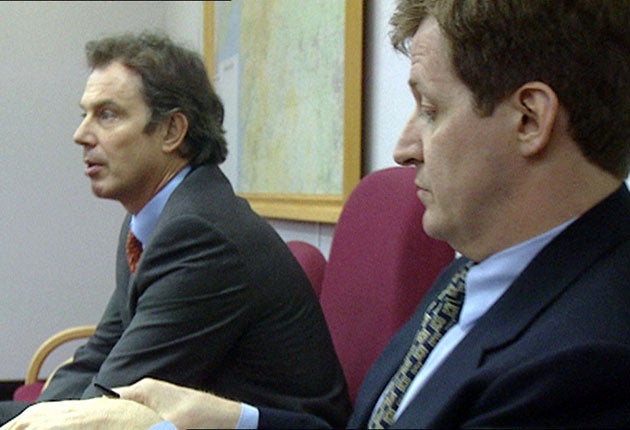Power and Responsibility, 1999-2001: The Alastair Campbell Diaries, Complete Edition, Vol. Three, By Alastair Campbell
Hindsight is not always a wonderful thing

Your support helps us to tell the story
From reproductive rights to climate change to Big Tech, The Independent is on the ground when the story is developing. Whether it's investigating the financials of Elon Musk's pro-Trump PAC or producing our latest documentary, 'The A Word', which shines a light on the American women fighting for reproductive rights, we know how important it is to parse out the facts from the messaging.
At such a critical moment in US history, we need reporters on the ground. Your donation allows us to keep sending journalists to speak to both sides of the story.
The Independent is trusted by Americans across the entire political spectrum. And unlike many other quality news outlets, we choose not to lock Americans out of our reporting and analysis with paywalls. We believe quality journalism should be available to everyone, paid for by those who can afford it.
Your support makes all the difference.The great challenge of history is to recapture things as they really were, when the outcome of wars was unknown, deaths were not foretold and things that "everyone knows" were known only to Time Lords.
Recent history is more accessible than, say, the English Civil War, partly because Tudor religiosity is so unlike the sensibility of YouTube. And yet contemporary history lays its own traps, because its closeness to the present deceives us into assuming that the recent past is like the present, and it is so easy to forget that YouTube was founded only in 2005. It did not exist when Alastair Campbell was the Great Communicator's Great Communicator.
For all that has been written about Tony Blair's government, there are surprisingly few contemporaneous diaries. David Blunkett kept one until 2005; Lance Price (Campbell's deputy) until 2001. Jonathan Powell, Blair's chief of staff, kept a diary but has not published it yet. And that is about it. Campbell's four-volume monsterwork is the best record of what it was like at the centre of politics at the time.
Memoirs are great. I love memoirs. But they are written with hindsight. Hindsight makes for fluent reading, because the author knows what is going to happen next. You can leave out the distractions, and make sense of the story. The absence of hindsight makes Campbell's diaries, and especially the giant, unedited volumes, of which this is the third, like a wall of noise. Never mind the "fierce urgency of now", this is another 700 pages of the fierce blundering confusion of now.
It is harder to read – and yet in some ways more rewarding – than the retrospective, smoothed-out versions. The story of Kosovo reads very differently when the outcome was still unknown, yet Blair's clarity from an early stage about the need to issue a credible threat of a ground invasion comes across to his credit. He didn't know if Bill Clinton would eventually do it, but Blair was determined to try, and, if it ended in fudge, to go down with everyone knowing he had tried.
The main interest, inevitably, as it was cut out of the sanitised diary that was published just after Blair stood down in 2007, is in the continuing story of Blair's relationship with Brown. Again, the immediacy of the daily reports, of the sulking, brooding and shouting, is of historical importance, because Campbell did not know how that story was going to end, either.
In the earlier diaries, Campbell was more suspicious of Brown than Blair was. Blair insisted that "there was good in him". By the end of the two years covered here, after Blair thought more than once about "pressing the nuclear button" and sacking Brown, Blair had had enough. Again and again, Brown accuses Campbell of being the source of the "psychological flaws" comment, which – it was revealed in volume two – he was. At one point, "TB said to him the fact that he keeps going on about it is what leads people to conclude that it might be true." Ouch.
As we know, Blair never did press the nuclear button, and as we also know, their positions had reversed by 2005, when Campbell helped persuade Blair that he could not fight his third election alone, and would need to work with Brown for the campaign.
Without the benefit of hindsight, it was impossible to imagine that the story could have ended that way. But that is what real history is like.
John Rentoul, senior political commentator of the IoS, is author of Tony Blair: Prime Minister (Little, Brown)
Join our commenting forum
Join thought-provoking conversations, follow other Independent readers and see their replies
Comments